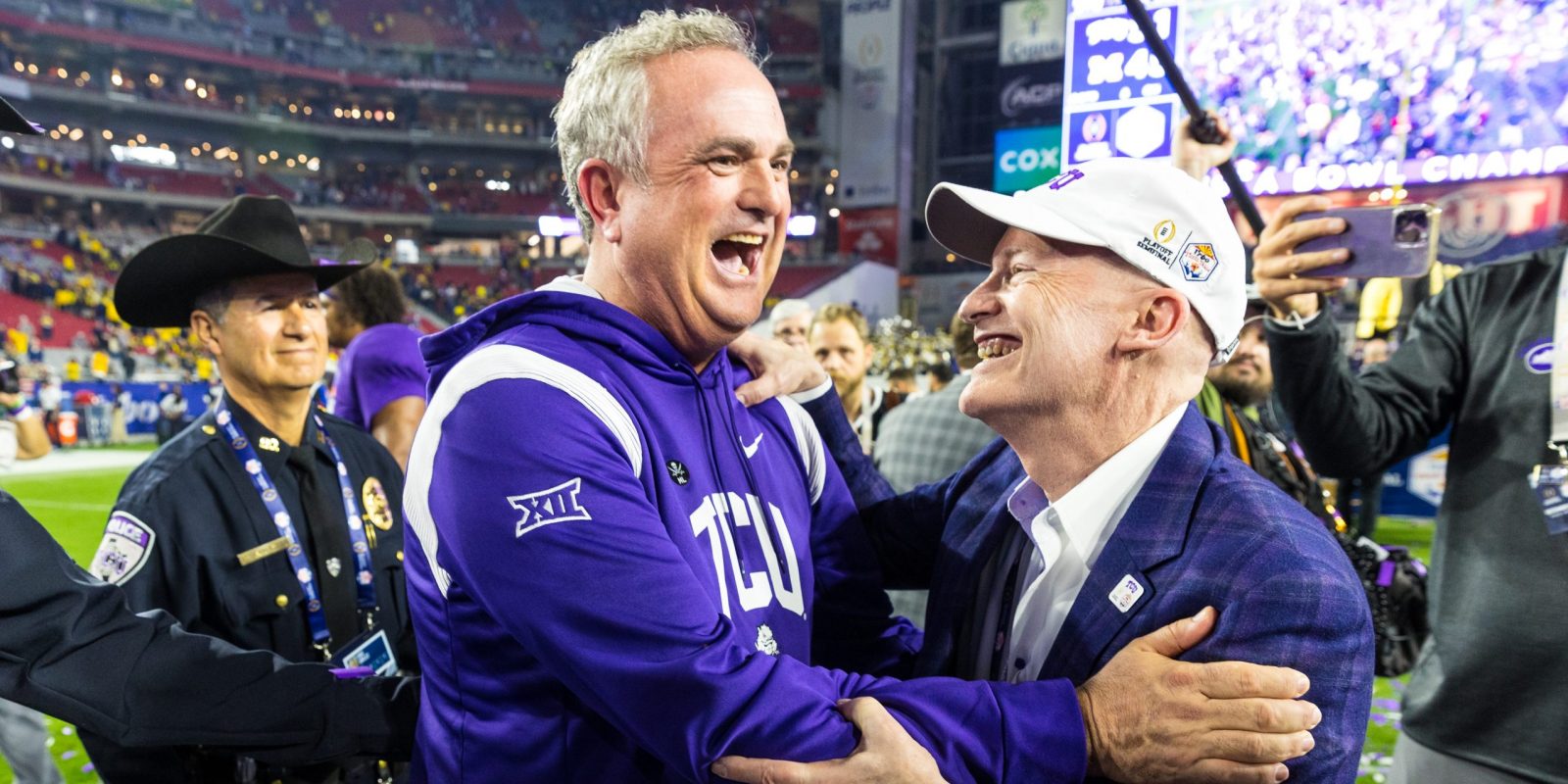


Football coach Sonny Dykes and Chancellor Victor J. Boschini, Jr. celebrate after the Fiesta Bowl victory over Michigan that sent TCU to the CFP National Championship.
The Everything School
TCU’s all-around success in 2022-23 sets the stage for more big things in future seasons.
Picked to finish seventh in the Big 12 Conference, TCU Football opened the 2022 season with 12 straight wins, including victories over nationally ranked Oklahoma, Kansas, Oklahoma State and Kansas State in consecutive weeks and another in prime time at Texas.
The Frogs’ work in the regular season enabled them to become the first team from Texas to reach the coveted College Football Playoff.
TCU fans flocked to Arizona, where on New Year’s Eve they saw the defense return two interceptions for touchdowns and Max Duggan ’22 find Quentin Johnston for a 76-yard scoring play en route to a thrilling 51-45 victory over Michigan that sent the Frogs to the CFP National Championship.
What a year.
But football’s run wasn’t even the start of a remarkable 2022-23 for TCU Athletics and the university.
Soccer and volleyball, women’s sports at TCU, first set the standard for success. Both reached the postseason before the Sonny Dykes-coached and Duggan-led football team pushed its way into the national conversation.
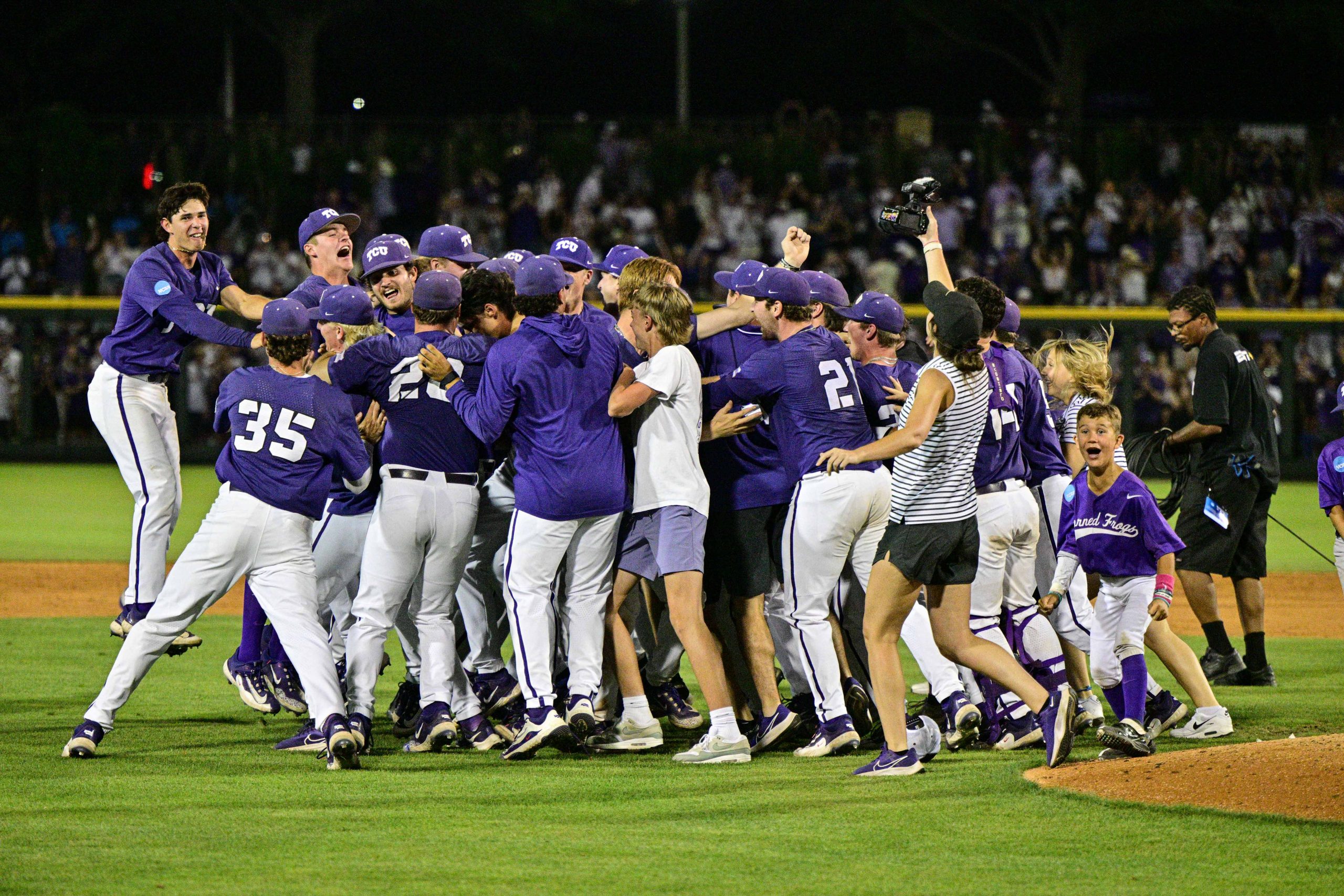
TCU baseball won the Fort Worth Super Regional in June to advance to the College World Series, where they were one of the final four teams playing. Photo by Michael Clements/Ellman Photography)
More Frogs teams followed into the top ranks of college athletics.
Men’s tennis won the national indoor title for the second straight year and reached the semifinals of the outdoor championships. Beach volleyball and equestrian went to the national semifinals, too. Rifle, like football, was the national runner-up.
By the time baseball was one of the last four remaining teams at the College World Series in June, TCU had a new moniker — the Everything School — as 19 of the 21 Frogs sports were represented in the postseason in 2022-23 and as the university gained recognition for its academic achievements.
These athletic triumphs all happened during the school’s sesquicentennial celebration. During the magical season, the Anne Burnett Marion School of Medicine also received full accreditation. TCU was ranked No. 3 in the Princeton Review for best quality of life for students, and the university reached 100,000 living graduates.
What a year, indeed.
The key now, with new sports seasons on the horizon, is sustaining the success.
“It’s important for all of our sports to be competitive,” said Jeremiah Donati, director of intercollegiate athletics. “That’s the standard that we’ve set. We just won’t tolerate mediocrity for very long. We have a tremendous amount of pride in all of our sports.”
Continuing to adapt
College athletics has changed dramatically in the past five years.
The NCAA created the transfer portal in October 2018 to help streamline the transfer process for student-athletes. Only players who had graduated and had eligibility remaining could transfer and compete without having to sit out one season.
That rule changed in April 2021, when everyone who transferred could play at another school right away. The decision has allowed struggling teams to make turnarounds in just one season.
The decision came two months before another landscape-altering ruling. The U.S. Supreme Court upheld a lower-court ruling that the NCAA was violating antitrust laws by preventing student-athletes from earning compensation, opening the door for players to receive payments for the use of their name, image and likeness.
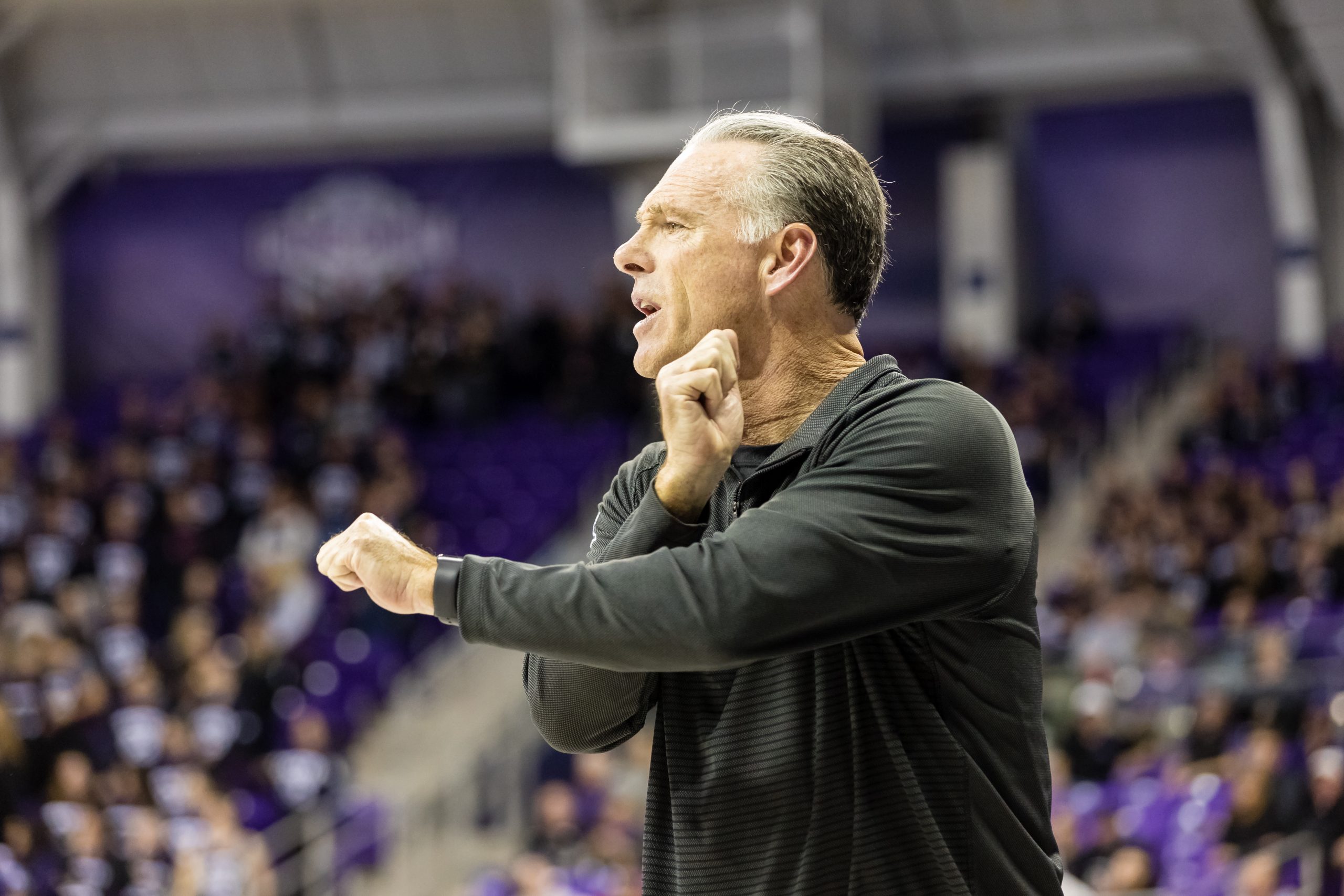
TCU men’s basketball coach Jamie Dixon turned the Frogs around in 2021-22 by dipping into the transfer portal for eight players. Photo by James Anger
The NCAA changed its rules banning student-athlete endorsement deals less than two weeks later, ushering in the birth of NIL arrangements.
The first TCU team to benefit from the transfer portal was men’s basketball, which turned over more than half of its roster after going 12-14 in the 2020-21 season. After that losing campaign, seven players transferred to other programs and one left for the NBA, and they and were replaced by eight players from the portal.
Retooled with the new student-athletes for 2021-22, the Frogs reached the second round of the NCAA Tournament.
After the team stayed mostly intact for 2022-23 and again reached the second round, coach Jamie Dixon ’87 saw five players enter the portal and Mike Miles Jr. and Damion Baugh leave for the NBA. To counter the exodus, TCU added five transfers.
To remain the Everything School, all TCU teams must continue to adapt to the portal and NIL.
“I think we’re figuring it out,” Dixon said.
Women’s volleyball used the transfer portal in coach Jason Williams’ first season to help the Frogs improve from 8-18 in 2021 to 17-11 in 2022, when they reached the second round of the NCAA Tournament.
New TCU women’s basketball coach Mark Campbell scoured the transfer portal after being hired in March. He found six players who add talent and experience to the roster. Ultimately, he hopes future rosters will include a mix of transfers and high school recruits.
“I really think you need both,” he said. “You need those kids who are part of your program for four years. That’s just a huge part of having a healthy program and a program that’s going to be long-standing and built the right way. But there’s some very serious talent in the portal with very good players. I think we’re going to be 50-50. You’ve got to walk through that year by year, case by case, but you need both.”
Talent alone doesn’t replace the need for hard work, but the latter isn’t a problem at TCU.
“It’s part of the deal. It’s part of what makes TCU great,” Dykes said. “They roll their sleeves up, they go to work, they figure out a way to do it. It’s not only the football team. It’s the entire university. It’s every athletic program at the university. That’s why there’s so much excellence at the place.”
University is all-in
Athletics also needs the support of the entire university, starting at its highest levels.
Chancellor Victor J. Boschini, Jr. has “allowed us to think about what was possible,” Donati said. “He understands that while Athletics is just one department on campus, it’s the most visible. So it brings alums and donors back to campus, and that has tremendous value for a university when you do those things well. Those are big moments, and that can lead to more support.”
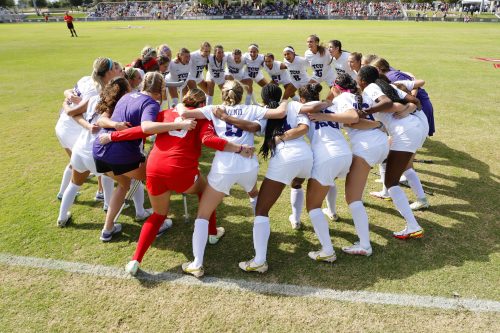
TCU vs Texas Tech during the Big 12 Championship soccer game at the Round Rock Multipurpose Complex in Round Rock, Texas on November 6, 2022 (Photo by/Gregg Ellman)
TCU has also made upgrades to facilities. Nearly $300 million has been spent the past 15 years to give Amon G. Carter Stadium a face-lift, and Schollmaier Arena received $80 million in improvements.
The next project is the $40 million Human Performance Center renovation and expansion, which will include the construction of a football performance center and a restoration and wellness center for all TCU student-athletes.
The costs are being covered by private donations, as has been the case with many past renovations. Support from the community and alumni base, along with the faculty and staff, has also contributed to the successes.
“You look around campus, there’s not a blade of grass out of place,” baseball coach Kirk Saarloos said. “Our facilities are great, but our people, that’s what TCU has always been about. It’s really special, special people from the top down. It starts with our fans, the chancellor, our athletic director and everybody between them and the coaches and our players. And I think the support that we have from everybody on campus, no matter what sport, is felt.”
By rule, TCU can’t provide NIL money directly to student-athletes. The Flying T Club has stepped in to help the university maintain athletics success. The school’s NIL collective is a nonprofit organization that turns donations into dollars for TCU student-athletes through, among other avenues, appearances in the community or with alumni.
The aim of the Flying T is to help keep TCU’s programs successful. Coaches have a responsibility, too, and if a program is wallowing, Donati said, he has a responsibility to hold it to the standard of winning.
“We’ve just come too far, we’ve made too many investments and too many commitments to this place to go backward,” he said. “When you’re having a struggle and you see all the people, from the chancellor and our donors and our student-athletes, who have made sacrifices and commitments and investments, you owe it to them, you owe it to the school to be true to the school and make sure that we are committed to those investments and that we’re seeing those returns.”
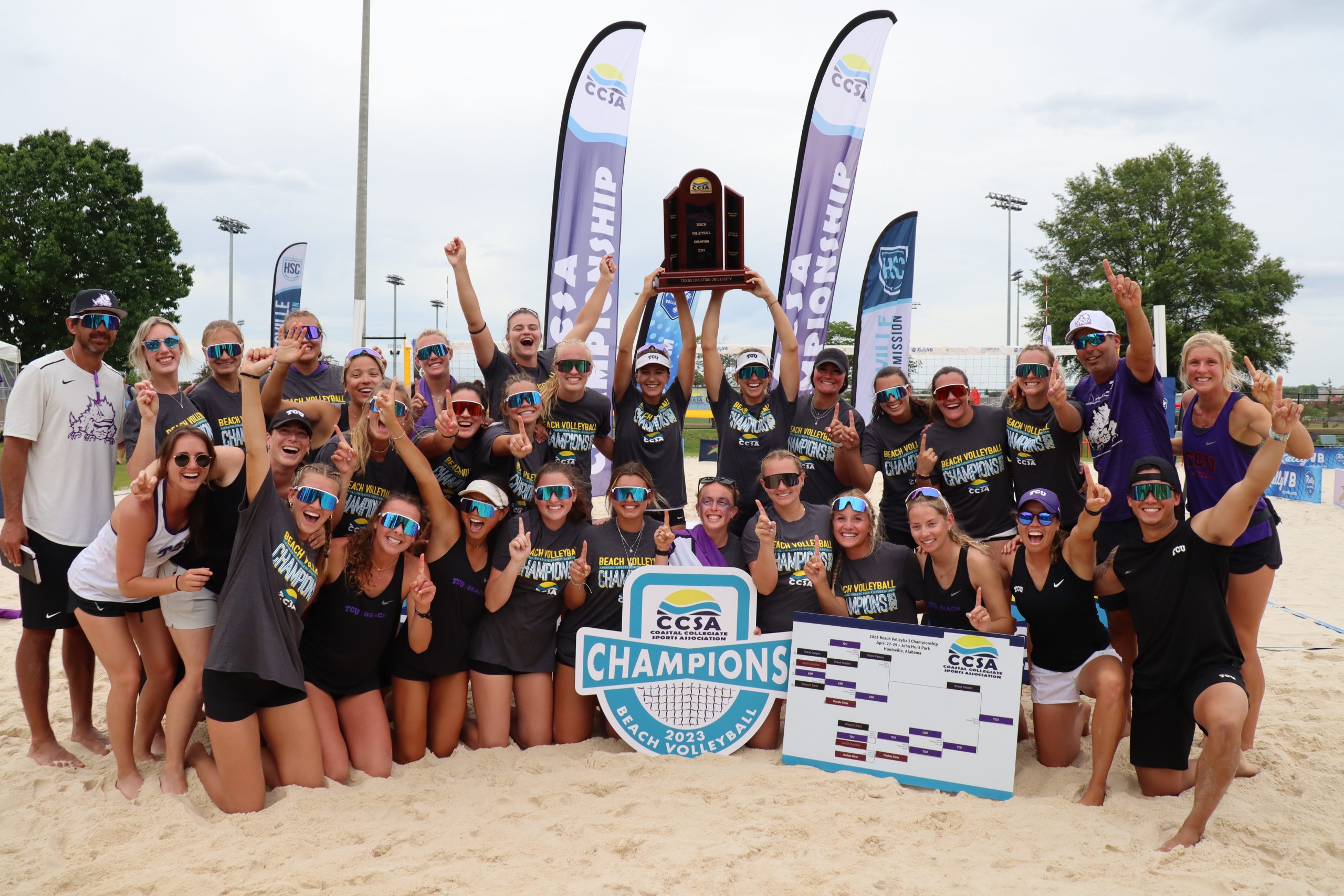
The beach volleyball team was ranked No. 1 much of the 2022-23 season and reached the national semifinals. Hector Gutierrez was one of six TCU coaches to be selected as a conference coach of the year. Courtesy of TCU Athletics
In hiring decisions, Donati has sought coaches who are forward-thinking and comfortable with the highs and lows of the transfer portal and NIL. Dykes’ understanding of the new era of college football helped make him the most attractive candidate to replace longtime coach Gary Patterson in 2021.
Six TCU coaches were selected as conference coaches of the year in 2022-23, and Dykes came away with 10 national awards.
No matter how good the facilities are and the support is, one thing still holds true from TCU’s Golden Era in the 1930s. As legendary football coach Dutch Meyer ’22 said, “You have to have the hosses to win the race.”
TCU had those standouts in the past year, too, with eight football players taken in the NFL draft, Miles and Baugh latching onto NBA teams, seven going in the MLB draft and Messiah Bright ’22 being selected in the second round of the National Women’s Soccer League’s draft.
The Frogs had dozens of all-conference picks and multiple All-America selections. Duggan was the runner-up for the Heisman Trophy and won the Davey O’Brien Award as the nation’s top quarterback. Johnston went 21st overall in the NFL draft, and third baseman Brayden Taylor was the 19th overall pick in the MLB draft.
Each of them found a home with the Frogs and thrived, helping turn TCU into the Everything School.
“It’s a hell of a time to be a Frog,” TCU pitcher Sam Stoutenborough said.

Your comments are welcome
Comments
Related Reading:
Sports: Riff Ram
Iron Man: Kaz Kazadi
The human performance specialist leads TCU Football’s strength and conditioning program into a new era.
Sports: Riff Ram
Lady Lightning
Record-setting sprinter Iyana Gray excels in arenas athletic and academic.